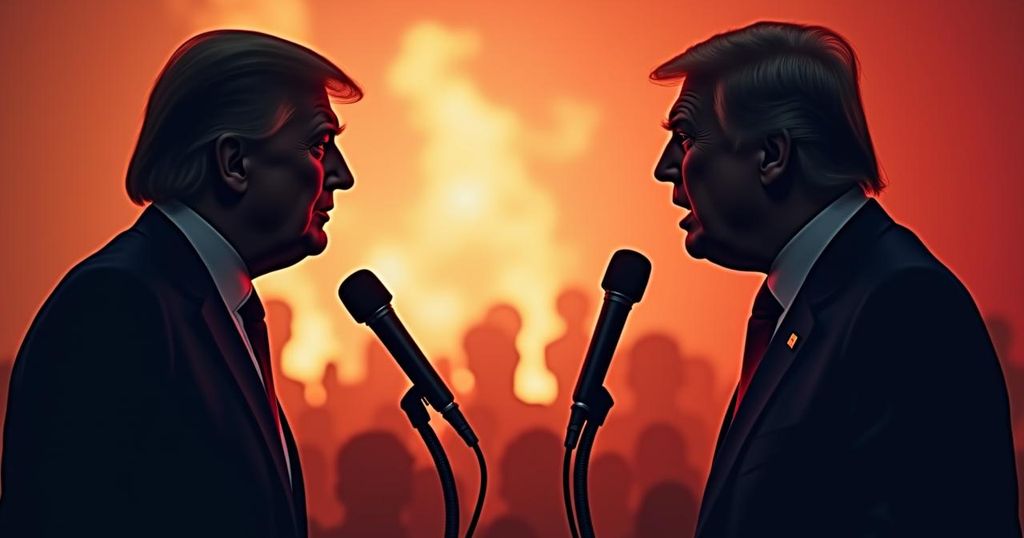Final Debate: Vance and Walz Clashing Over Key Policies Ahead of Election
In a pivotal Vice Presidential debate, candidates JD Vance and Tim Walz engaged in a lively discussion covering key issues like the Middle East conflict, climate change, immigration, and the legitimacy of the 2020 election results. The debate, characterized by open exchanges, marked the last primetime appearance before the approaching election, with both candidates emphasizing differing approaches to critical national concerns.
In the final debate of the 2024 election season, Vice Presidential candidates Senator JD Vance (Republican, Ohio) and Governor Tim Walz (Democrat, Minnesota) faced off in a crucial discussion held on a Tuesday evening, moderated by CBS. The debate lasted for 90 minutes and witnessed the candidates engage in a robust exchange of policies, primarily launching critiques at the opposing presidential candidates. The opening topic centered on the escalating tensions in the Middle East, particularly the recent missile strikes from Iran directed at Israel. Senator Vance asserted, “Donald Trump actually delivered stability in the world and he did it by establishing effective deterrence. People were afraid of stepping out of line,” emphasizing the previous administration’s approach to foreign policy. Conversely, Governor Walz countered by expressing, “What’s fundamental here is that steady leadership is going to matter,” criticizing the effectiveness of Donald Trump’s leadership during the current geopolitical crisis. The debate shifted to natural disasters such as Hurricane Helene, with Governor Walz noting, “There’s no doubt this thing roared onto the scene faster and stronger than anything we’ve seen.” He criticized Trump’s dismissal of climate change as a hoax. Senator Vance remarked on the Democratic stance regarding climate policy by stating, “What the president has said is that if the Democrats… believed climate change is serious, what they would be doing is more manufacturing and more energy production in the United States of America.” Throughout the night, various critical issues were discussed, including immigration, economic policies, health care, abortion, and the legitimacy of the 2020 election results. Unlike traditional presidential debate formats, both candidates’ microphones were on throughout the discussion, facilitating a more dynamic interaction, particularly when Governor Walz pressed Senator Vance on the question of the 2020 election outcome, to which Vance refrained from providing a definitive answer. This debate represented the last opportunity for both campaigns to address voters in a primetime setting, as the election date approaches with only five weeks remaining. Current polls indicate a competitive race between the candidates at both national and battleground levels.
The Vice Presidential debate provides a platform for candidates to articulate their policy positions and criticize their opponents, especially in a tight election race. As both candidates are gearing up for a consequential election, this debate focused on pressing national concerns, including foreign relations, climate change, and domestic issues. With the election drawing near, voters are keenly observing how each candidate addresses these critical topics, which may significantly influence their choices at the ballot box. The debate format allowed for more open exchanges, differing from typical debate protocols, thereby contributing to a more revealing discourse regarding the candidates’ views and their respective party platforms.
The final debate of the 2024 election cycle witnessed Vice Presidential candidates JD Vance and Tim Walz engage in an intense discussion on various pivotal issues, including international conflict, climate change, immigration, and the ongoing ramifications of the 2020 election. With the election only weeks away and polls indicating a close race, the candidates sought to outline their visions while simultaneously casting doubt on their opponents’ capabilities. As the electorate prepares to make a decision, this debate could prove instrumental in shaping public perception of the candidates and their party platforms.
Original Source: www.wcax.com




Post Comment